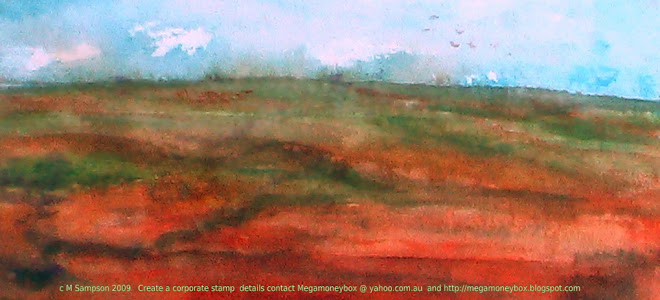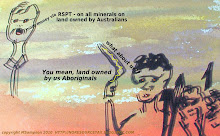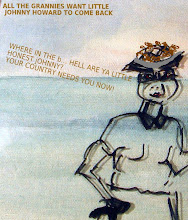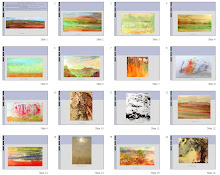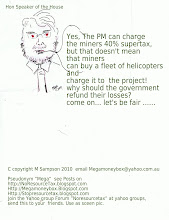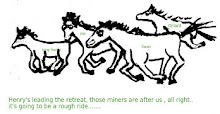> SYDNEY, May 27 (Reuters) - Australia's government may be considering
> changes to its controversial new mining tax, which critics argue will hit
> economic growth and supporters say will ensure miners pay a fair price for
> limited national resources.
>
> Treasurer Wayne Swan, after weeks of public and private debate, has so far
> said he will proceed with the original "tax framework" to take effect in
> 2012, but details of the tax are subject to negotiation and could be
> tweaked.
>
> * WHAT'S CHANGED SINCE THE MAY UNVEILING OF THE TAX?
>
> Prime Minister Kevin Rudd has said the 40 percent tax rate is set in stone
> and will not give ground here for fear of damaging his authority in the
> lead-up to elections later this year. But The Australian and The Sydney
> Morning Herald newspapers reported on Thursday that Rudd's Labor party is
> moving to soften the blow by redefining a windfall or "super" profit to
> returns on assets exceeding 12 percent, up from 5.3 percent now.
> [ID:nSGE64P0M8]
>
> The 5.3 percent threshold-- linked to the the 10-year government bond
> yield AU10YT=RR -- is a key gripe among the miners, who think it is
> unrealistically low.
>
> A Treasury-sanctioned tax consultation panel is due to deliver its first
> report to the government on Friday after meeting over the last week with
> mining companies. The panel's report is expected to focus on the
> definition of a super profit.
>
> The tax is not due to be introduced until 2012, after the next general
> election, so there is even a chance the government will be voted out
> before it can implement it. [ID:nSGE64J02A]
>
> WHAT ARE THE POSSIBLE POINTS OF COMPROMISE?
>
> The least likely point of compromise seems to be the headline rate of 40
> percent. But even here, Rudd has some wiggle room, describing the headline
> rate as "about right".
>
> Beyond that, there are aspects of the complex tax which, if changed, could
> dramatically lower its impact.
>
> * EXISTING VS FUTURE PROJECTS: Australia's two largest miners, Rio Tinto
> RIO.AX <RIO.L and BHP Billiton (BHP.AX) (BLT.L), have called on the
> government to exclude existing mining operations and apply the tax only to
> projects beginning after 2012. The government says such exclusions would
> forfeit too much revenue and discourage miners from expanding.
>
> Miners can still look to offsetting tax credits for exploration and
> development costs, resulting in a lower effective tax rate than 40
> percent. But what about all the hundreds of billions of dollars already
> sunk into existing projects? Will the government award retrospective tax
> credits for these?
>
> The architect of the tax, Treasury chief Ken Henry, has argued against
> this. But miners have support from some economists who suggest a credit
> for 40 percent of original investments. However, a group of 20 prominent
> academic and business economists has publicly backed the tax, saying the
> sector should fork over more of its profits. The group, including the
> former chairman of the Australian Competition and Consumer Commission,
> Allan Fels, issued a statement supporting the tax.
>
> * FINANCING COSTS: Iron ore miner Fortescue Metals Group Chief Executive
> Andrew Forrest (FMG.AX) says unlike company tax, the new mining tax will
> hit firms higher up the profit statement, before deducting interest on
> borrowings. This means banks will not fund new projects unless businesses
> stump up more equity.
>
> Playing the nationalist card, Forrest says this opens the door to
> deep-pocketed foreign firms, especially state-owned Chinese ones, to buy
> up stakes in new Australian projects. A compromise could involve financing
> costs being excluded from calculations.
>
> * WILL THE GOVERNMENT BACK DOWN ON THE TAX?
>
> Rudd will not reverse course on the tax, despite conservative opposition
> threats to overturn it if they secure an unexpected victory. But with
> Rudd's support in opinion polls slipping dangerously and the tax causing
> unease among voters, fuelled in part by a multi-million-dollar advertising
> campaign by miners, a compromise to cool the issue politically seems
> certain.
>
> It is a matter of finding a face-saving solution for Rudd that keeps the
> resource giants on side.
>
> Even if negotiations break down, there is one last hope for the miners: a
> legal challenge. The largest mining state, Western Australia, is
> consulting its lawyers over whether the tax exceeds Canberra's powers
> under the national constitution, which forbids the centre from taxing the
> property of state governments. Two constitutional experts cast doubt,
> however, on whether there would be grounds for a legal challenge.
> [ID:nSYU009974] (Additional reporting by Rob Taylor in CANBERRA; Editing
> by Ed Davies)
>
>
>
Thursday, May 27, 2010
Fw: change or no change?
Subject: change or no change?
